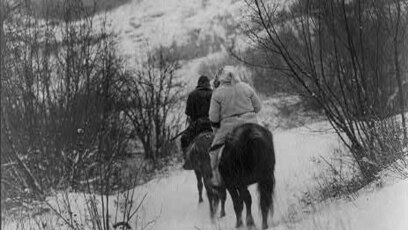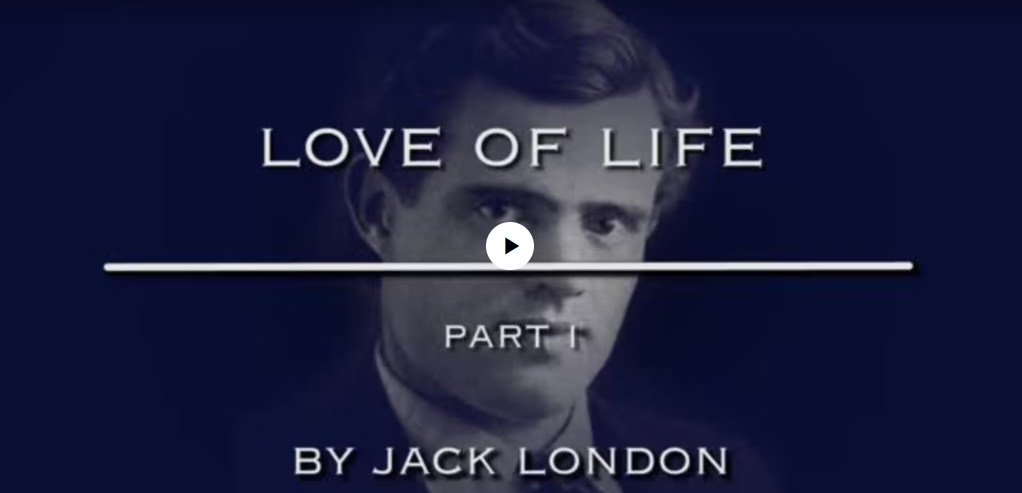We present the first of four parts of the short story “Love of Life,” by Jack London. The story was originally adapted and recorded by the U.S. Department of State.
The two men moved painfully down the bank and fell among the rocks that were scattered everywhere. They were tired and weak. Their faces showed the patient appearance that results from difficulty long endured. They were heavily burdened with blanket packs which were tied to their shoulders. Each man carried a gun. They walked in a leaning position, the shoulders forward, the head farther forward, the eyes fixed upon the ground.
“I wish we had a couple of those cartridges that are lying in our cache,” said the second man.
His voice was completely without expression. And the first man, walking into the milky stream that flowed over the rocks, made no reply.
The other man followed at his heels. They did not remove their shoes, although the water was icy cold. It was so cold that their feet soon were without feeling. In places, the water dashed against their knees, and both men found it difficult to remain standing.
The man who followed slipped upon a smooth rock and nearly fell. He recovered his footing with great effort, at the same time uttering a sharp cry of pain. He seemed faint and stretched one hand forward, seeking support against the air. When he had steadied himself, he stepped forward. But he slipped again and nearly fell. Then he stood still and looked at the other man, who had never turned his head.
The man stood still for fully a minute, as if he were deciding something. Then he called: “I say – I say, Bill, I hurt my foot.”
Bill struggled ahead through the milky water. He did not look around. The man watched him go, and although his face lacked expression, as before, his eyes had the look of a wounded animal.
The other man climbed the farther bank of the stream and continued straight ahead without looking back. The man in the stream watched him. His lips trembled a little.
“Bill!” he cried.
It was the despairing cry of a strong man in trouble, but Bill’s head did not turn. The man watched him go, struggling forward up the hill toward the skyline. He watched him go until he passed over the hilltop and disappeared. Then he turned his gaze and slowly examined the circle of the world that remained to him now that Bill was gone.
The sun was low in the sky, almost hidden by a cover of clouds. The man looked at his watch, while supporting his weight on one leg. It was four o’clock in the afternoon. The season was near the end of July or the first of August. He did not know the exact date within a week or two, but that was enough to know that the sun marked the northwest.
He looked to the south and decided that somewhere beyond those hills lay the Great Bear Lake. Also, he knew that behind the same hills the Arctic Circle cut its way across the plains of northern Canada, called the Barrens. This stream in which he stood flowed into the Coppermine River, which in turn flowed north and emptied into the Arctic Ocean. He had never been there, but he had seen it once on a map.
Again his gaze completed the circle of the world about him. It was not a cheerful sight. Everywhere was soft skyline. The hills were all low-lying. There were no trees, no grasses. There was nothing but a vast emptiness that brought fear into his eyes.
“Bill!” he whispered, once, and twice, “Bill!”
He stood trembling in the milky water, feeling the vastness pressing in upon him with great force. He began to shake as with a disease, until the gun falling from his hand into the stream brought him back to reality. He fought with his fear and regaining his self-control, he recovered the gun from the water. He pushed his pack more toward his left shoulder. This helped to take a portion of its weight off the foot he had hurt. Then he proceeded, slowly and carefully, in great pain, to the bank of the stream.
He did not stop. With a worry that was madness, unmindful of the pain, he hurried up the hill to the top, over which his companion had disappeared. But at the top he saw a valley, empty of life. He fought with his fear again and won. Then once more he moved the pack farther toward his left shoulder and struggled down the hill.
The bottom of the valley was very wet. Thick plant life held the moisture close to the surface and the water flowed from under his feet at every step. He picked his way carefully across the valley and followed the other man’s footsteps along the rocks which made small islands in the sea of wet plant life.
Although alone, he was not lost. Farther on, he knew, he would come to where dead pine trees bordered the shore of a little lake. In the language of that country it was called the “land of little sticks.” Into that lake flowed a small stream, the water of which was not milky. There was grass along that stream, but no trees. He would follow the stream until it divided. He would cross this place of dividing to another stream, flowing to the west. This he would follow until it emptied into the river Dease. Here he would find a cache under an upturned boat and covered with many rocks. In this cache there would be cartridges for his empty gun, and fishhooks and lines. Everything he needed for catching food would be there. Also he would find flour, a little meat, and some beans.
Bill would be waiting for him there, and they would find a boat and row south down the Dease to the Great Bear Lake. And south across the lake they would go, ever south, until they came to the Mackenzie River. And south, always south they would go, while the winter raced after them and the ice formed in the streams, and the days grew cold. South they would go, to some warm place where the trees grew tall and full and there was food without end.
These were the thoughts of the man as he struggled forward. But as strongly as he struggled with his body, he struggled equally with his mind. He tried to believe that Bill had not deserted him. Surely Bill would wait for him at the cache. He was forced to think this thought. Otherwise, there would not be any reason to continue, and he would lie down and die.
As the ball of the sun sank slowly into the northwest, he recalled every inch of his and Bill’s flight south ahead of the oncoming winter. And he thought again and again of the food in the cache. It had been two days since he had anything to eat. It was a far longer time since he had had enough to eat. Often he picked muskeg berries, put them into his mouth, and ate them. A muskeg berry is a small seed in a drop of water. In the mouth, the water melts away and the seed tastes bitter. The man knew there was no real food value in the berries; but he ate them patiently with a hope greater than his experience.
At nine o’clock that night he hit his toe on a rocky surface, and from weakness and tiredness he fell to the ground. He lay for some time, without movement, on his side. He took his pack from his back and dragged himself into a sitting position. It was not yet dark. While some light remained he felt among the rocks for pieces of dried plants. When he had gathered a pile, he built a fire and put a tin pot of water on it to boil.
He unwrapped his pack. The first thing he did was to count his matches. There were 67. He counted them three times to be sure. He divided them into several portions, wrapping them in paper. He put one portion in his empty tobacco pack, another in the inside band of his hat, and a third under his shirt against his flesh. This accomplished, he began to worry whether he had counted correctly. He unwrapped them all and counted them again. Yes, there were 67.
He dried his wet shoes and socks by the fire. The moccasins were badly torn. His socks were worn through in places, and his feet were bleeding. The area between his foot and leg, the ankle, was very painful. He examined it. It had swelled until it was as large as his knee. He cut a long strip from one of his two blankets and bound the ankle tightly. He cut other strips and bound them about his feet to serve both for moccasins and socks. Then he drank the pot of hot water, wound his watch, and pulled his blankets around him.
He slept like a dead man. The brief darkness at midnight came and went. Then the sun rose in the northeast. It can better be said that day dawned in that quarter of the sky, because the sun was hidden by gray clouds.
At six o’clock in the morning he waked, quietly lying on his back. He gazed straight up into the gray sky and knew that he was hungry. As he lifted himself on his elbow, he was frightened by a loud noise. There was a caribou looking at him curiously. The animal was not more than 50 feet away, and instantly, into the man’s mind came the picture of caribou meat cooking over a fire. From habit, he reached for the empty gun and aimed it. The caribou leaped away and disappeared across the rocks.
Now it’s your turn to use the words in this story. Have you ever been lost out in nature? What is the most important thing to do when you get lost? Let us know in the comments section or on WWW.VOA-STORY.COM
_______________________________________________________________
Quiz
See how well you understand the story by taking this reading quiz.
Quiz – Love of Life, Part One

Start the Quiz to find out
_____________________________________________________________
Words in This Story
bank – n. the higher ground that is along the edge of a river or stream
cartridge(s) – n. a tube which you put into a gun and which contains a bullet and explosive material
stream – n. a natural flow of water that is smaller than a river
faint – adj. weak and dizzy
tremble(d) – v. to shake slightly because you are afraid, nervous, excited, etc.
pine tree(s) – n. a tree that has long, thin needles instead of leaves and that stays green throughout the year
bean(s) – n. a seed that is eaten as a vegetable and that comes from any one of many different kinds of climbing plants
row – v. to move a boat through water using oars
muskeg berries – n. a type of small, round fruit that grows in areas of soft, wet land
drag(ged) – v. to move along the ground or floor while being pulled
pot – n. a deep, round container that is used for cooking
match(es) – n. a short, thin piece of wood or thick paper with a special tip that produces fire when it is scratched against something else
moccasin(s) – n. a flat shoe that is made of soft leather and is similar to a shoe originally worn by some Native Americans
caribou – n. a large type of deer that lives in northern parts of the world
